Abstract
The relationship between tourism and conservation is particularly important to the UAE because its rapid economic growth has made the country a notable source of outbound tourism. This study aimed to find out the perception of Emiratis towards environmental and cultural conservation. The method of research used to collect data was the survey technique. Through its adoption, the researcher gathered the views of 40 Emiratis who expressed mixed views regarding environmental and cultural conservation in the UAE.
The mixed reviews stemmed from the informants’ awareness of the need to conserve the environment and their failure to align their behaviors with the goals of environmental conservation. This paper recommends that more Emiratis should be educated about environmental and cultural conservation to improve their appreciation for sustainable tourism. This recommendation aligns with the need to embrace sustainable development in the UAE.
Background
The high number of people who are traveling today for business or pleasure purposes has elevated the profile of tourism as a promising economic sector. The tourism industry is also a top income earner for many countries and a significant source of employment for many people around the world (UNESCO, 2018). However, like other economic sectors, different challenges affect the growth of the tourism industry. They include environmental pollution, loss of cultural heritage, and social dislocation (Szell & Hallett, 2013).
To manage such issues, the concept of sustainable tourism has been adopted around the world as a framework to help different communities and countries benefit from tourism while preserving the environment and cultural heritage of the people affected (UNESCO, 2018). Nonetheless, the future of tourism is largely influenced by stakeholder perceptions towards environmental and cultural conservation (Chang, 2017).
Tourists are major stakeholders in the tourism sector because they influence the design of conservation and sustainability programs. Their motivation to conserve the environment also affects how well they complement efforts to protect ecosystems (Romero-Brito, Buckley, & Byrne, 2016). The role of tourists as stakeholders in environmental sustainability has been explored by researchers such as Bennett and Dearden (2014) who point out the need to integrate travelers as partners in conservation. However, aligning environmental and cultural sustainability goals in the tourism industry largely depends on the proper understanding of the views of tourists regarding sustainability and conservation in the first place.
Research Gap
For many years, researchers have explored the perceptions of tourists towards conservation. However, most of their studies have used samples from western countries and a few selected Asian nations. Therefore, a few of them have focused on the Middle East. At the same time, even fewer studies have explored the perceptions of UAE citizens regarding environmental and cultural conservation. Therefore, a research gap exists in understanding the views of UAE citizens regarding conservation. This gap is informed by the existence of cultural and social differences between western and eastern perceptions of conservation (Murray & Agyare, 2018).
For example, most western countries are not religious states like the UAE. Therefore, the perceptions of their citizens towards conservation may differ from the perceptions of UAE citizens toward environmental and cultural conservation. Based on this understanding, there is a need to explore the perceptions of Emiratis towards environmental and cultural conservation. Thus, the purpose of this study is to establish the extent that Emiratis are embracing environmental and cultural conservation as part of their lifestyle.
Significance of Study
This study is significant to the stakeholders of the UAE tourism sector because it could improve their understanding of Emirati views regarding conservation. Academically, the findings of this study are useful in expanding the body of literature regarding environmental and cultural conservation in the UAE because the views presented in this study could provide a holistic understanding of people’s attitudes regarding sustainable development.
From a policy perspective, the findings of this paper could also inform decision-making processes relating to environmental and cultural conservation in the UAE and the wider Middle East region. This area of development is particularly important to the UAE, which has embraced sustainability as a core principle of its tourism development practices. Indeed, by understanding the perspectives of Emiratis towards environmental and cultural conservation, it would be easier for policymakers to design effective cultural and environmental preservation programs because they would be doing so from an informed point of view.
Research Aim
This research aims to find out the perception of Emiratis towards environmental and cultural conservation. The emphasis of the investigation will be on investigating whether Emiratis have embraced conservation as a common lifestyle practice and how their level of awareness regarding the need to conserve Emirati culture and environment reflects on their behavior when traveling.
Methodology
Data Collection
Data was collected from family members and friends. The researcher surveyed the informants in different social settings (mostly gatherings and social encounters).
The data collection process happened by sampling the respondents’ views regarding different aspects of environmental and cultural conservation. The findings were written on paper. The researcher was present to document the findings and answer any questions the informants may have had. The presence of the researcher was informed by the quest to make sure the respondents understood the questions correctly. The survey was conducted informally. Stated differently, there was no specific timeframe for conducting the surveys because they were done when both the researcher and respondents were available.
Data Analysis
The process of data analysis was conducted using Microsoft Excel software. This software enabled the researcher to tabulate and analyze data using pie charts and bar graphs. Statistical assessment tools, such as “mean” and percentages were also employed to quantify the respondents’ views.
Sample Population
The sample population included in the study comprised of Emiratis who had traveled within the last 12 months. Therefore, all the participants included in the study were all from the UAE and had traveled within one year of conducting the study.
Table 1 below shows that the majority of the respondents were between the ages of 18 years and 28 years, while the least number of respondents was above 60 years.
Table 1. Ages of Respondents (Source: Developed by Author).
Table 2 below shows that most of the respondents (52%) were male, while women made up 48% of the total sample. Alternatively, there were 21 men and 19 women who took part in the study.
Table 2. Gender Distribution (Source: Developed by Author).
Based on the insights provided in the introduction section of this paper, the following two hypotheses were formulated.
Hypotheses
- Emiratis have a positive perception towards conservation
- Emiratis have a neutral perception regarding the conservation of cultural heritage
Results
The respondents were asked to state destinations where they mostly traveled. Figure 1 shows that the USA was the most traveled destination, followed by Switzerland and France, respectively. The least traveled destinations were Barcelona, Australia, Germany, United Kingdom (U.K), Thailand, and Turkey.
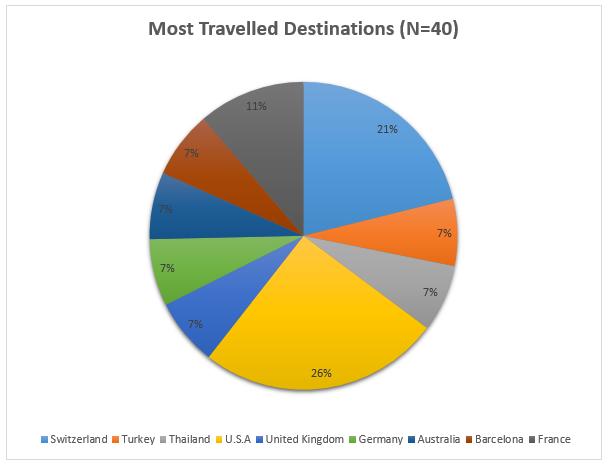
According to figure 2 below, the respondents said the countries they selected were mostly known for their beautiful nature and clean environment, as opposed to their culture. The percentage of informants who felt this way was 75%, while only 25% believed that culture was the main attraction.
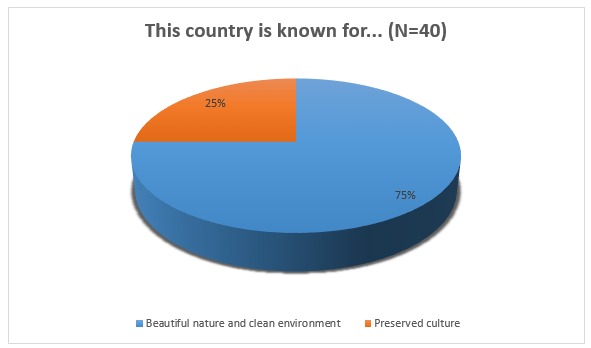
The third question posed to the respondents related to the importance of preserving the environment. According to figure 3 below, most of them said that preserving the environment was “very” important.
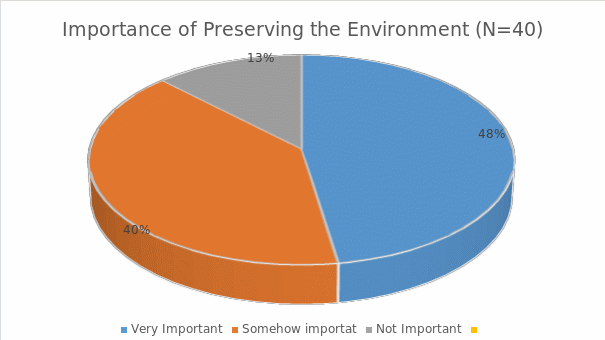
The fourth question posed to the respondents related to the importance of the respondents to preserve the Emirati culture. According to figure 4, most of the respondents (85%) said it was “very important” to preserve the culture, while 15% of them believed it was “somehow” important.
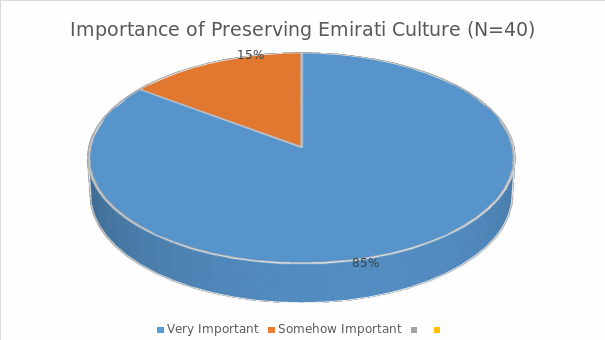
The fifth question posed to the respondents related to the creation of a sense of awareness regarding environmental conservation. According to figure 5 below, the average of their means was 4.2, meaning that they were strongly aware of the need to conserve the environment and preserve local culture.
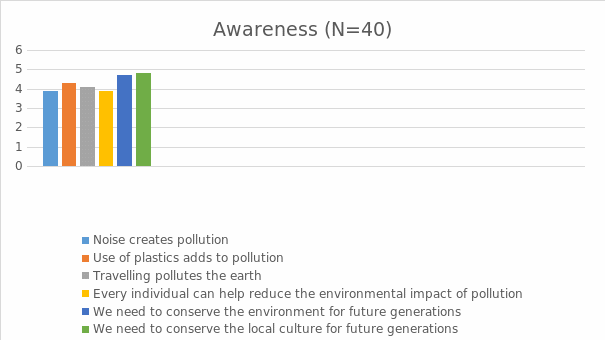
The sixth question posed to the respondents related to their everyday habits relating to conservation. According to figure 6 below, the strongest response is related to the proper disposal of waste. Comparatively, the weakest response is related to the low use of public transport systems.
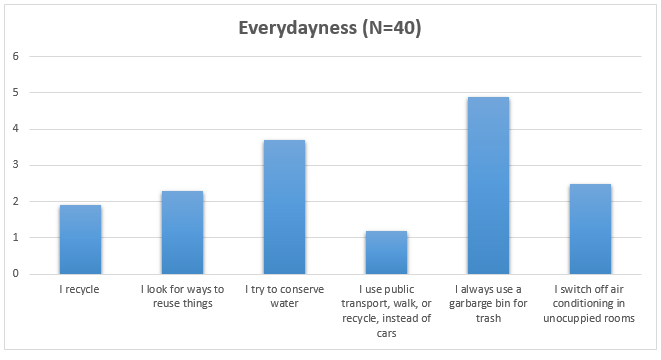
The seventh question posed to the respondents related to traveling.
Based on the findings highlighted in figure 7 below, the average response was 2.9 for positive environmental behaviors when traveling. This statistic means that most of the respondents had adopted “good” environmentally friendly behavior when traveling.
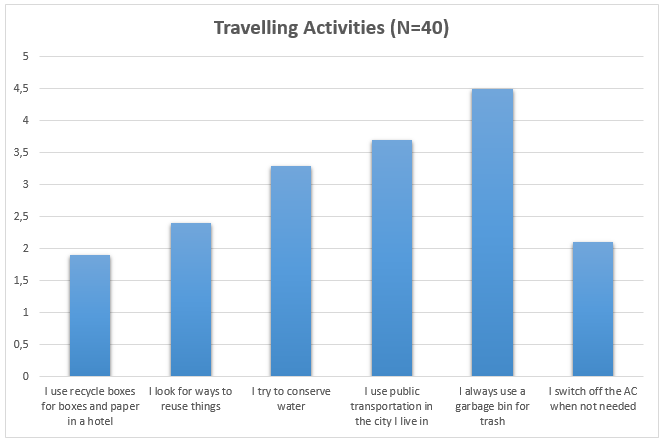
The eighth question related to the level of concern regarding tourists who did not observe environmentally appropriate behavior. According to the statistics presented in figure 9 below, the overall mean for the level of concern was 3.0, meaning that the respondents had an “average” level of concern.
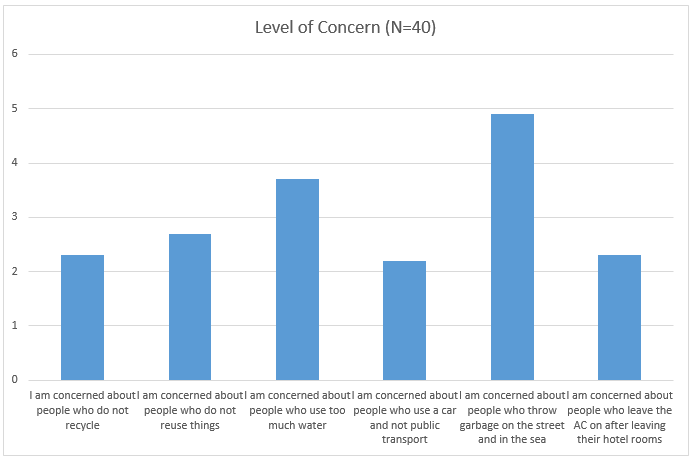
According to figure 10 below, all the respondents said they were happy that their quest to preserve the local culture would be inherited by their children and grandchildren. In addition, 27.5% of the sample also said they would be happy if their children and grandchildren inherited their environmental conservation practices.
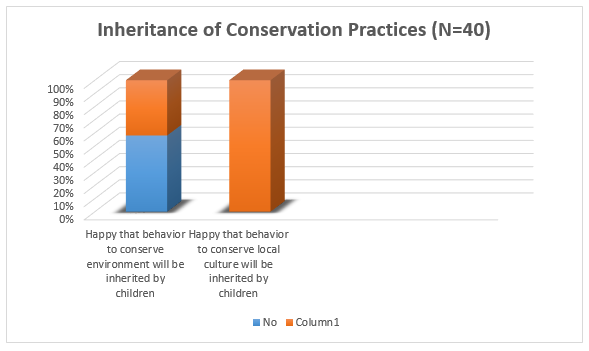
Conclusion
The findings highlighted above show that the respondents sampled in this study had mixed views regarding conservation. The mixed responses come from the certainty and uncertainty regarding the appropriateness of the respondents’ attitudes and perceptions towards environmental and cultural conservation. For example, in figure 10 above, most of the informants were not happy about their children inheriting their environmental conservation practices.
This finding means that most of the participants were not proud of their conservation practices. However, the same figure 10 also shows that the informants were happy about the possibility that their children would inherit their cultural conservation practices. None of the respondents said they would not be happy about the inheritance of their cultural conservation practices. Based on these findings, the response’s views about conservation are mixed. Therefore, the first hypothesis, which states that Emiratis have a positive perception towards conservation, is accepted and the second hypothesis, which says that Emiratis have a neutral perception towards the conservation of cultural heritage, is equally accepted.
The failure of the respondents to align their awareness for conservation with sustainable behaviors mirrors the findings of Yaghi and Alibeli (2017) which showed that most Emiratis held mixed views regarding the willingness to pay for environmental and cultural conservation programs. Stated differently, the researchers found that the willingness to pay for conservation in the UAE was inconsistent, fluctuating, and conditional (Yaghi & Alibeli, 2017).
This finding alone shows that the insights provided in this study align with those of previous investigations. At the same time, the high levels of awareness noted regarding the need to conserve the environment also mirror the findings of other researchers, such as Hammami et al. (2017), who found that up to 85% of Emirati students were aware of the effects of environmental pollution. These findings were reported after evaluating the awareness and attitudes of Emirati students towards environmental pollution caused by plastics.
The gap in awareness and implementation reported in this study could be filled by educating more Emiratis about the need to conserve the environment because gaining more knowledge about conservation would help Emiratis to change their behaviors and align them with the sustainable development goals of the UAE (Al-Naqbi & Alshannag, 2018).
References
Al-Naqbi, A., & Alshannag, Q. (2018). The status of education for sustainable development and sustainability knowledge, attitudes, and behaviors of UAE university students. International Journal of Sustainability in Higher Education, 19(3), pp. 566-588.
Bennett, N. J., & Dearden, P. (2014). Why local people do not support conservation: Community perceptions of marine protected area livelihood impacts, governance, and management in Thailand. Marine Policy, 44(1), 107-116.
Chang, L. H. (2017). Tourists’ perception of dark tourism and its impact on their emotional experience and geopolitical knowledge: A comparative study of local and non-local tourist. Journal of Tourism Research Hospitality, 6(3), 1-5. Web.
Hammami, M. B., Mohammed, E. Q., Hashem, A. M., Al-Khafaji, M. A., Alqahtani, F., Alzaabi, S., & Dash, N. (2017). Survey on awareness and attitudes of secondary school students regarding plastic pollution: Implications for environmental education and public health in Sharjah city, UAE. Environmental Science Pollution Research, 24(1), 20626-20633. Web.
Murray, G., & Agyare, A. (2018). Religion and perceptions of community-based conservation in Ghana, West Africa. PLoS ONE, 13(4), 1-15.
Romero-Brito, T. P., Buckley, R. C., & Byrne, J. (2016). NGO partnerships in using ecotourism for conservation: Systematic review and meta-analysis. PLoS ONE, 11(11), 1-19. Web.
Szell, A. B., & Hallett, L. F. (2013). Attitudes and perceptions of residents and tourists toward the protected area of Retezat National Park, Romania. International Journal of Humanities and Social Science, 3(4), 18-34.
UNESCO. (2018). Sustainable tourism. Web.
Yaghi, A., & Alibeli, M. (2017). Theoretical and empirical analysis of citizens’ willingness to pay: Ethical and policy implications for the environment in the The United Arab Emirates. Public Integrity, 19(1), 41-57.